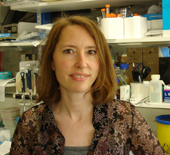Jennifer Rohn is a cell biologist and the founder and editor of LabLit.com, an online magazine devoted to scientist culture and its portrayal in fiction. Her first novel, Experimental Heart, has just been published.
Unbeknownst to me, when I was trained formally as a scientist, I was being taught far more than the methodology I needed to perform and analyze experiments - I was learning to think critically about everything, both inside of the lab and out. Many years later, this habit of filtering my entire world through an open mind tempered by a screen of severe skepticism has become as natural to me as breathing.
As I pass through life, I am assaulted by everyday claims and hypotheses that are just begging to be picked apart mercilessly. Take, for example, an advertisement claiming that a particular formulation stops skin from aging. When I see statements like this, I immediately squint at the inevitable fine print. What criteria were used to assess a slowdown in aging? How many people were tested? Was there was an adequate control group? Did the participants work for the company that produced it, and how many times was the study was performed? Was the research assessed by a peer-reviewed journal? Could an apparent effect on aging actually be the indirect cause of something else, and was this possibility ruled out? Of course most of these answers are not on the advert, so in the absence of more research, I wouldn’t dream of taking the claims at face value. The same can be said for things I read in the newspapers and on the internet, and that I hear on the radio, the TV and in the common room over coffee.
Scientists are not the only ones who are trained at critical thinking, but our particular exposure to concepts such as hypotheses, controls and statistics are particularly valuable in ferreting out the plausible from the suspect. You don’t have to be a professional scientist to know the useful basics, however: I picked up many of these valuable insights in my high school science education back in America.
In my opinion, this analytical ability is probably the most important outcome of a firm educational grounding in science. Otherwise people will be at the mercy of a world who wants us to take on blind faith that which we should never accept without thorough questioning. Science is important, therefore, even when we are not performing scientific research. Or looking at it another way, every instance of cause and effect in our lives can be viewed as an experimental outcome needing to be analyzed properly.
 Published by
Published by
2 Comments
An excellent write-up which explicitly explain making of a rational persona-I myself have identified with the descriptions as if many of the things were true to me as well.But I must admit that a self training like that is in fact a painful process -even Charles Darwin had lamented loosing of certain artistic qualities of brain owing to such bent up of mind ! But a training of this kind is a service to mankind ,service to uplift the values of science !
Wish you a great going !
If I'd read your entry first, I think I wouldn't have bothered with mine, which says similar things but not nearly as well.
I really enjoyed this piece, especially the line "this habit of filtering my entire world through an open mind tempered by a screen of severe skepticism has become as natural to me as breathing". I think you've summed up my outlook as well.
R.
1 TrackBack
The Open Laboratory 2009 - the submissions so far…
Here are the submissions for OpenLab 2009 to date. As we have surpassed 150 entries, all of them, as well as the "submit" buttons and codes, are under the fold. You can buy the 2006, 2007 and 2008 editions...……